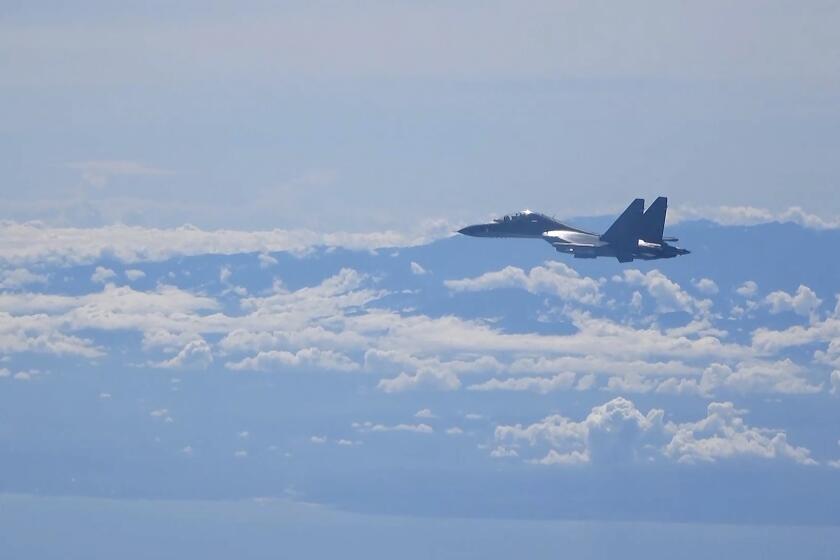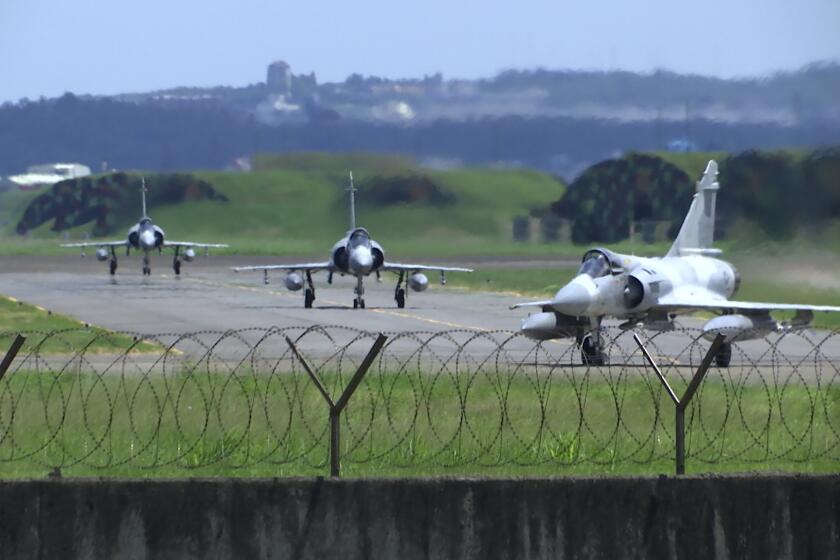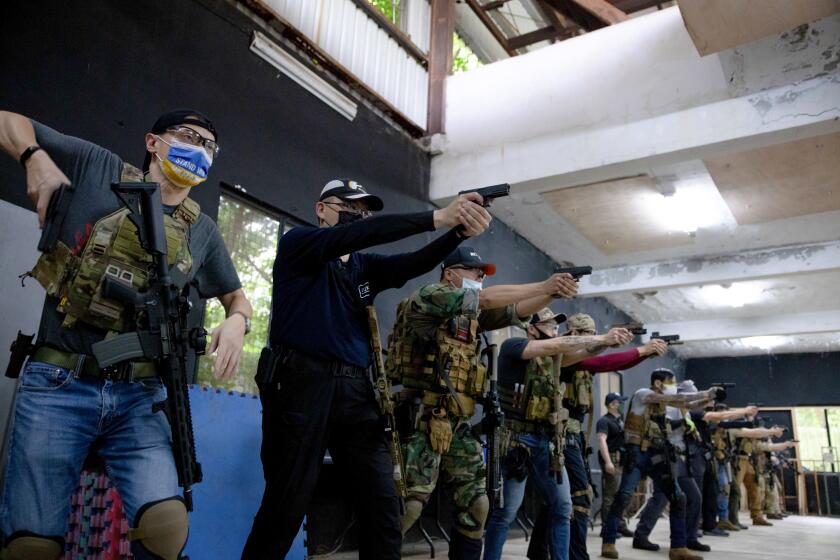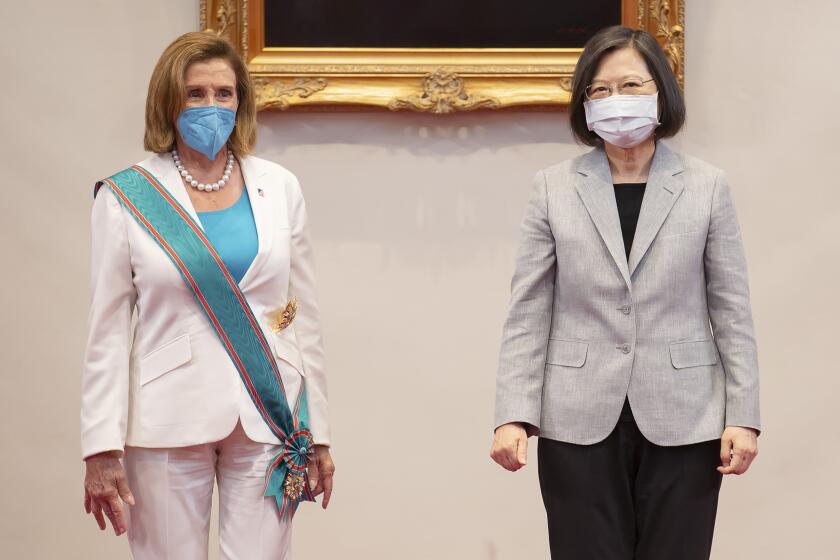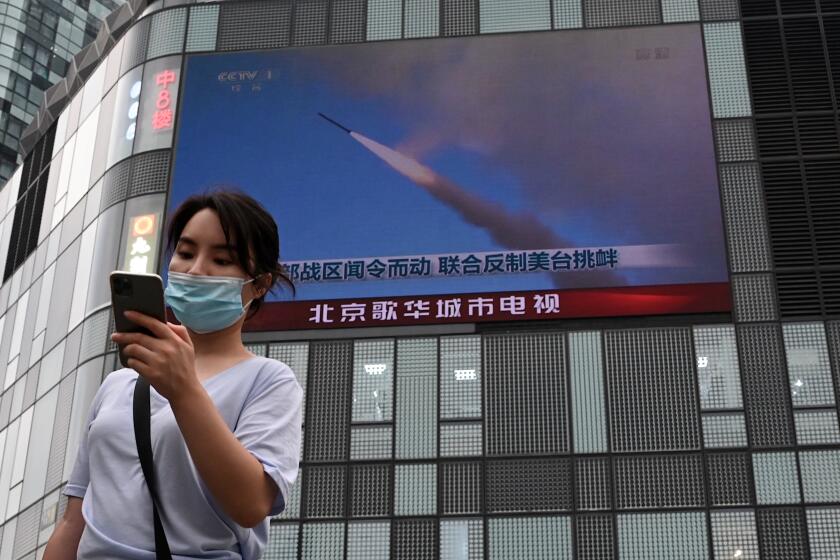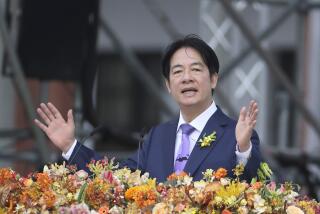After days of military drills, China reaffirms threat of force to annex Taiwan
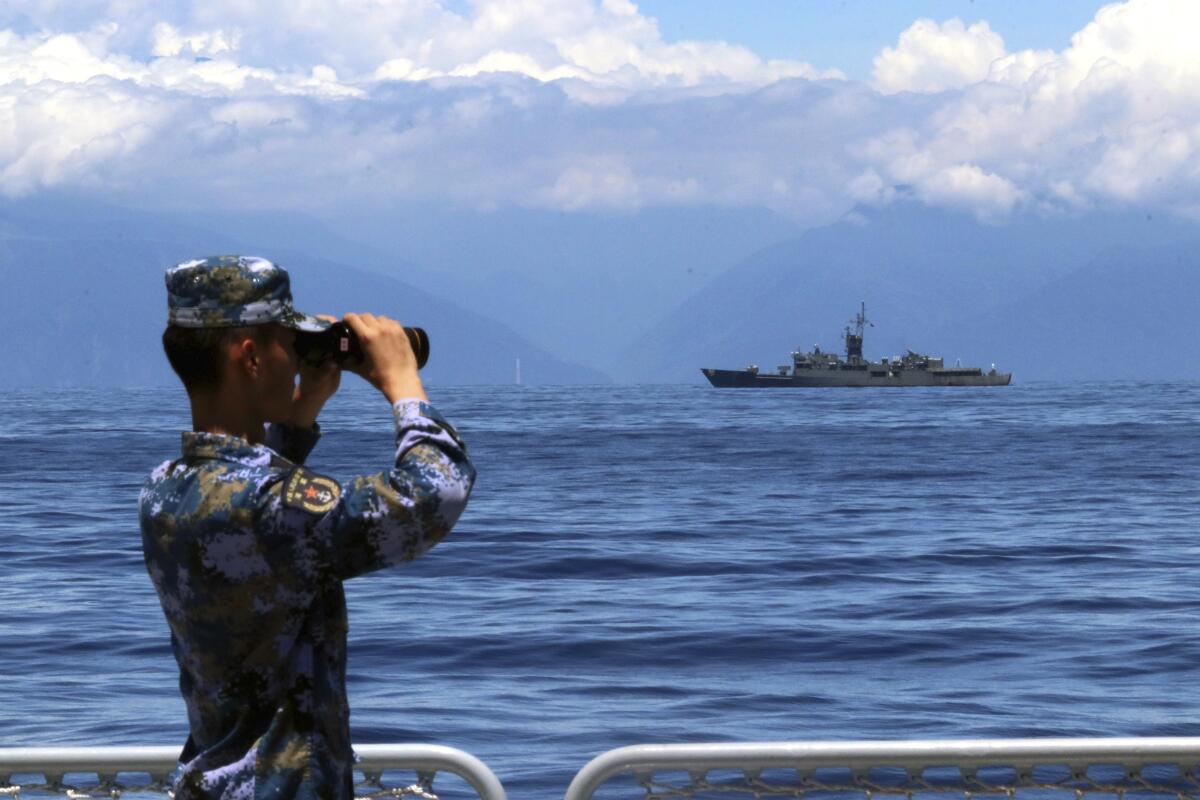
BEIJING — China on Wednesday repeated military threats against Taiwan while appearing to wind down wargames near the self-governing island that it claims as its own territory — maneuvers that have raised tensions between the two sides to their highest level in years.
The lengthy policy statement issued by China’s Taiwan Affairs Office and its news department followed almost a week of missile firings and incursions into Taiwanese waters and airspace by Chinese warships and air force planes.
The actions have disrupted flights and shipping in a region crucial to global supply chains, prompting strong condemnation from the U.S., Japan and others.
An English-language version of the Chinese statement said Beijing would “work with the greatest sincerity and exert our utmost efforts to achieve peaceful reunification.”
But, it added, “we will not renounce the use of force, and we reserve the option of taking all necessary measures. This is to guard against external interference and all separatist activities.
“We will always be ready to respond with the use of force or other necessary means to interference by external forces or radical action by separatist elements. Our ultimate goal is to ensure the prospects of China’s peaceful reunification and advance this process.”
Chinese warships and aircraft crossed the median line of the Taiwan Strait following U.S. House Speaker Nancy Pelosi’s visit to Taipei.
China said its military maneuvers were prompted by a visit to Taiwan last week by U.S. House Speaker Nancy Pelosi (D-San Francisco), but Taiwan says such visits are routine and that China used that merely as a pretext to increase its threats.
In an additional response to Pelosi’s visit, China said it was cutting off dialogue on issues such as maritime security and climate change with the U.S., Taiwan’s chief military and political backer.
Taiwan’s foreign minister warned Tuesday that the Chinese military drills reflected ambitions to control large swaths of the western Pacific. Taipei conducted its own exercises to underscore its readiness to defend itself.
Beijing extended its ongoing exercises without announcing when they would end, although they appear to have run their course for the time being.
Climate change and fighting trade in illegal drugs such as fentanyl are rare areas where China and the U.S. have found common cause.
China’s Defense Ministry and its Eastern Theater Command both issued statements saying the exercises had achieved their aim of sending a warning to those favoring Taiwan’s formal independence and their foreign backers.
Taiwanese President Tsai Ing-wen and her Democratic Progressive Party are “pushing Taiwan into the abyss of disaster and sooner or later will be nailed to the pillar of historical shame!” Defense Ministry spokesperson Col. Tan Kefei was quoted as saying in a statement posted to the Chinese Defense Ministry’s website.
Troops taking part in the exercises had “effectively tested integrated joint combat capabilities,” the Eastern Theater Command said on its Twitter-like Weixin microblog account.
“The theater troops will monitor changes in the situation in the Taiwan Strait, continue to conduct military training and preparations, organize regular combat readiness patrols in the Taiwan Strait, and resolutely defend national sovereignty and territorial integrity,” spokesperson Col. Shi Yi was quoted as saying.
Since Russia invaded Ukraine, more Taiwanese say they are willing to fight if attacked by China. But without firearms or sufficient military training, many wonder how to prepare.
Taiwan split from the mainland after civil war in 1949, and the island’s 23 million people overwhelmingly oppose political unification with China, preferring to maintain close economic links and the status quo of de facto independence.
Through its maneuvers, China has pushed closer to Taiwan’s borders and may be seeking to establish a new normal in which it could eventually control access to the island’s ports and airspace.
Along with lobbing missiles into the Taiwan Strait, the nearly weeklong drills saw Chinese ships and planes crossing the center line in the strait that has long been seen as a buffer against outright conflict.
The U.S., though it has no formal diplomatic ties with Taiwan in deference to Beijing, is bound by federal law to ensure that the island can defend itself and to treat all threats against it as matters of grave concern.
China’s furious response could drive more Taiwanese toward independence and push neighboring Asian nations to strengthen their defense strategies.
In response to China’s drills, Taiwan’s military Tuesday held live-fire artillery drills in Pingtung County on its southeastern coast.
Meanwhile, in Australia, where a recent change of government was seen as a chance for the country to improve its troubled ties with China, the Chinese ambassador said Wednesday that the new administration must “handle the Taiwan question with caution.”
Ambassador Xiao Qian told the National Press Club that he was “surprised” Australia had signed a statement with the U.S. and Japan condemning China’s firing of missiles into Japanese waters in response to Pelosi’s visit.
Xiao said China wanted to resolve the situation peacefully, but “we can never rule out the option to use other means.”
China viewed U.S. House Speaker Nancy Pelosi’s trip to Taiwan as a direct challenge. As tensions ratchet up, Taiwan is preparing for war. Are its people ready?
“So when necessary, when compelled, we are ready to use all necessary means,” Xiao said. “As to what does it mean by ‘all necessary means’? You can use your imagination.”
In London, the British government summoned Chinese Ambassador Zheng Zeguang to the Foreign Office on Wednesday to demand an explanation of ”Beijing’s aggressive and wide-ranging escalation against Taiwan” following Pelosi’s visit.
“We have seen increasingly aggressive behavior and rhetoric from Beijing in recent months, which threaten peace and stability in the region,” said Foreign Secretary Liz Truss. “The United Kingdom urges China to resolve any differences by peaceful means, without the threat or use of force or coercion.”
More to Read
Sign up for Essential California
The most important California stories and recommendations in your inbox every morning.
You may occasionally receive promotional content from the Los Angeles Times.
